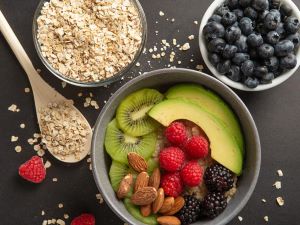The Portfolio Diet: An Update
By Reed Mangels, PhD, RD
The Portfolio Diet is a vegan or near-vegan diet that contains foods and nutrients known to lower blood cholesterol levels. It includes plant protein from legumes, particularly from soy; a type of fiber called viscous fiber which is found in foods such as oats, barley, eggplant, okra, apples, berries, and psyllium; plant sterols from fortified foods or supplements; nuts; and plant sources of monounsaturated fats such as avocado and olive, canola, and soy oils. This diet has been used successfully in randomized controlled studies to lower blood total and LDL cholesterol (1, 2). For example, in one study subjects following the Portfolio Diet had a reduction in LDL cholesterol levels that, for many participants, was similar to what would be expected with statins (a type of medication that lowers blood lipid levels) (3). These good results were seen even in subjects who were already eating a low-saturated fat, low-cholesterol diet before the study started. These positive results were seen in relatively short-term studies, with the longest lasting 6 months.
Recently, researchers set out to examine long-term adherence to a Portfolio Diet and see if this offered benefits (4). They did this by looking at the diets of more than 160,000 women and more than 40,000 men who participated in the Nurses’ Health Study, the Nurses’ Health Study II, and the Health Professionals Follow-up Study. Study subjects’ reported diets were scored for the amount of plant protein (legumes), nuts and seeds, viscous fiber sources, phytosterols, and plant monounsaturated fat sources. The more of these foods that were eaten, the higher the Portfolio Diet Score was.
After as much of 30 years of follow-up, participants with a higher Portfolio Diet Score had a 14% lower risk of heart disease, cardiovascular disease, and stroke compared to those with lower scores (4). It’s important to note that these results were seen in people who were eating more of the foods that are included in a Portfolio Diet but were not, strictly speaking, following a Portfolio Diet, nor were they vegan.
The researchers noted that only small amounts of some foods recommended in the Portfolio diet were eaten, even in the group with the highest Portfolio Diet Score. This suggests that even partially adopting the Portfolio Diet pattern is beneficial. It’s likely that even greater benefits would be seen in those who adhere more closely to the Portfolio Diet.
References
- Jenkins DJ, Kendall CW, Faulkner D, et al. A dietary portfolio approach to cholesterol reduction: combined effects of plant sterols, vegetable proteins, and viscous fibers in hypercholesterolemia. Metabolism. 2002;51:1596-1604.
- Jenkins DJ, Chiavaroli L, Wong JM, et al. Adding monounsaturated fatty acids to a dietary portfolio of cholesterol-lowering foods in hypercholesterolemia. CMAJ. 2010;182:1961-1967.
- Jenkins DJ, Kendall CW, Marchie A, et al. Effects of a dietary portfolio of cholesterol-lowering foods vs lovastatin on serum lipids and C-reactive protein. JAMA. 2003;290:502-510.
- Glenn AJ, Guasch-Ferré M, Malik VS, et al. Portfolio Diet Score and risk of cardiovascular disease: Findings from 3 prospective cohort studies. Circulation. 2023;148:1750-1763.
The contents of this website and our other publications, including Vegetarian Journal and Vegan Journal, are not intended to provide personal medical advice. Medical advice should be obtained from a qualified health professional. We often depend on product and ingredient information from company statements. It is impossible to be 100% sure about a statement, info can change, people have different views, and mistakes can be made. Please use your best judgment about whether a product is suitable for you. To be sure, do further research or confirmation on your own.

